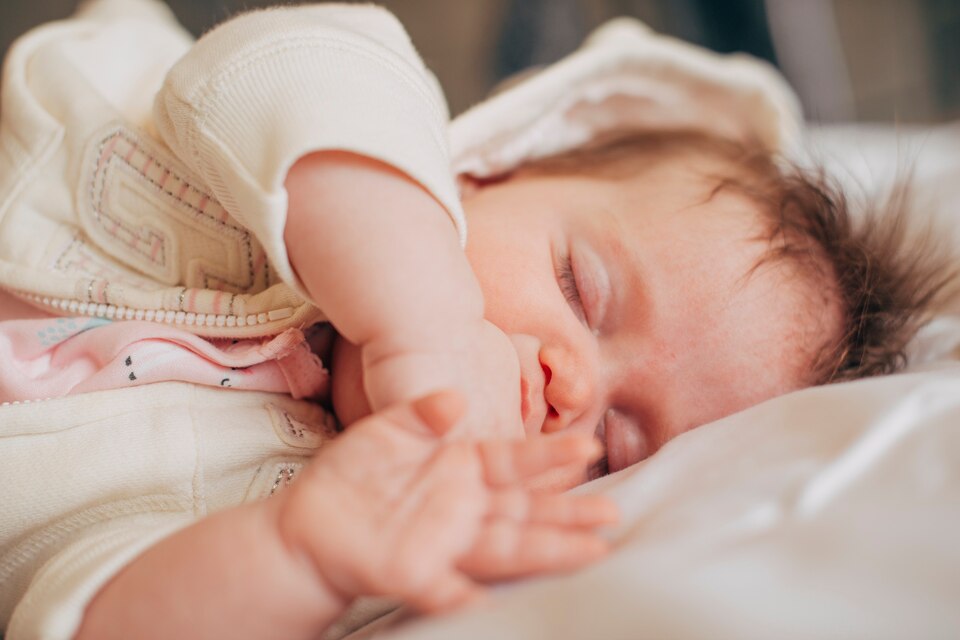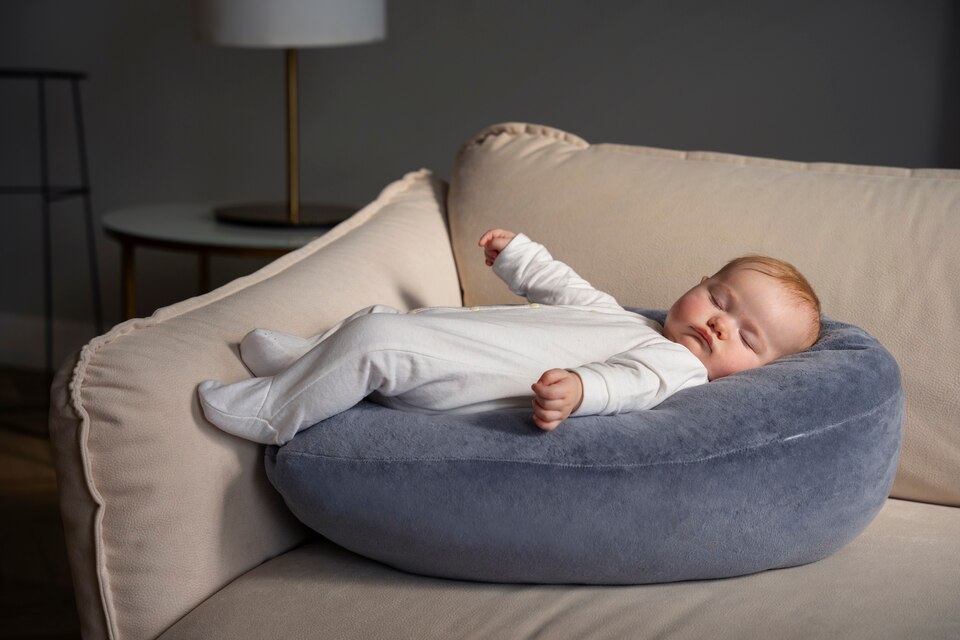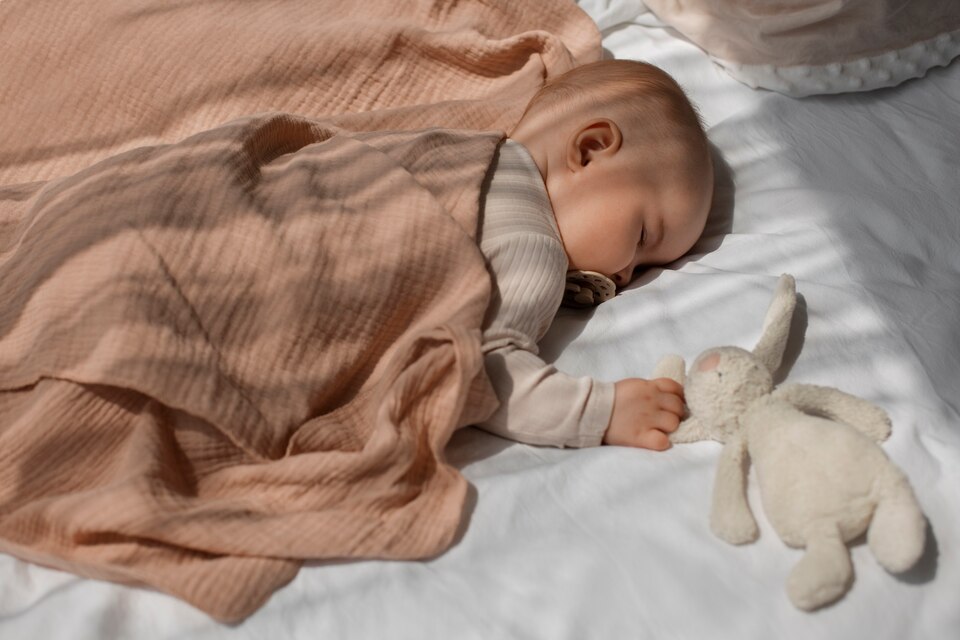Introduction
Disruption in sleep is the bane of almost every parent, especially when babies are very young. Their sleep patterns keep changing so often as they grow that they can be expected to wake very frequently at night. While this is completely normal, a case of prolonged sleep disturbances or very intense ones can be a cause for concern. This is where understanding what causes these interruptions is crucial for seeking the correct answers for making a baby sleep better.
In this article, we shall look at some of the most common causes of interruptions in sleeping for a baby, starting with hunger or gas causing discomfort and moving on to sleep being affected by neurological causes. We would also discuss how smart solutions like the Smart Cradle Mini are assisting parents in finding practical solutions and ensuring their babies receive the required amount of sleep.
What Causes Babies to Jump in Their Sleep?
In fact, as far as babies twitching or “jumping” while they sleep, such situations are quite normal and can frequently be one of the more startling experiences for the parents concerned. It is actually sleep reflex myoclonus or startle reflex, with the sudden movement being normal in the case of infants. These are the following reasons for that:
- Immature brain networking: Babies are born with an immature nervous system, which means their brain has to learn the very rudiments of moving the parts of the body. Consequently, sudden jerks or jumps as the baby sleeps often occur and usually fade off as he develops.
- Startle Reflex. The startle reflex is a natural defense against a perceived threat, which often happens while the baby is in REM (Rapid Eye Movement) sleep. Such as when most babies will reflexively jump or jolt when hearing suddenly a noise or there is some movement nearby.
- Growth and Development: This newly muscular control that babies are developing changes, which can trigger movements while sleeping. Most of them will go away altogether by the time the baby is 3-4 months old.
Smart cradles such as the Smart Cradle Mini use gentle rocking motions to create a calming environment where sleep cycles are less disturbed by these sudden movements. Since these babies will be settled during their sleep cycles in that environment, the cradle minimizes the chances of startling the baby awakes due to being in a comfortable and consistent sleep environment.
What Causes Sleep Disorders in the Brain?
Brain development is found to have associated sleep disorders in babies. Most of these sleep disturbances are only part of a normal growth process in babies, but some babies also suffer from neurological sleep disorders. Some of the most possible causes include:
- Maturation of Sleep Cycles: The most immature part of the brain is in the process of learning how to regulate sleep cycles. Speedy sleep cycles mostly occur among babies when compared to adults resulting in frequent waking usually resolved when the brain matures and the sleep pattern settles around the age of 6 months.
- Immature Brain: Premature infants or infants with developmental delays may have a poorly established brainstem which hinders their ability to smoothly shift in between stages of sleep or to maintain a normal sleep cycle.
- Neurological Disorders: There are a few instances when babies suffering from neurological problems such as epilepsy or by having neurodevelopmental disorders can experience problematic sleep. Sleep-wake disorders, restless sleep, waking up too often, and having trouble going to sleep all the time are features of these infant conditions.
Celestial yet bright causes have been neurological in few cases when a baby has a sleeping disturbance. However, most babies in these cases outgrow sleep disturbances with the maturity of their brains and nervous system. Care-wise, however, some of the unique baby solutions available in the marketplace, Smart Cradle Mini™ will improve sleep quality by tracking and responding to a baby’s movement.
What Are Three Common Sleep Problems in Early Childhood?
Of course, brain-type irregularity, but there are quite some other common infant nightmares typical in early childhood:
- Waking at Night: Most babies wake up several times in the night, at least in the first few months. In this period, babies would wake up due to the transition from REM sleep to deeper stages and may stir or scream; they would like to be comforted or fed or just need a change in position.
SOLUTION: Smart cradles like the Smart Cradle Mini are excellent platforms for monitoring sleep patterns, judging the times when one baby wakes, and soothing them back to sleep with movements or sounds.
2. Colic’s and Digestion-Related Problems: Crying comes as a result of being disturbed while sleeping due to colicky or gas pains. This is more when they are young because their bodies are adjusting from life inside the womb.
SOLUTION: An elevated sleeping position like that provided by a smart cradle will relieve the discomfort of reflux and gas. Furthermore, gentle rocking or vibrating motions by a cradle will also soothe a baby and reduce the pain of tough digestion.
3. Separation Anxiety-She’s Old Enough Now: Babies begin developing a sense of attachment with the caregivers. Separation anxiety is one common problematic condition that disorderly sleep causes, where a baby wakes up in distress due to the absence of parents during nighttime.
SOLUTION: Smart baby beds and cradles come with remote monitoring and video communication features: hence the baby and the parent can feel reassured, alleviating their anxiety thereby curbing night waking.
Conclusion
There are many causes of sleep disturbances in babies. Determining these factors will greatly assist in selecting the most appropriate strategies for dealing with sleep problems. Such factors may be physiological, including the startle reflex and brain maturation; or common factors such as colic and separation anxiety. Sleep patterns of babies are usually changing.
Smart devices like the Smart Cradle Mini offer a high-tech solution for modern parents in dealing with sleep issues. Cry detection, bumps and motions, and environmental monitoring, among many more, give these smart cradles a responsive, flexible philosophy of sleep that allows real-time adjustments based on the need of the baby.
By integrating age-old sleep training methods with high-tech gadgets, the parents would make it possible for their babies to learn healthy sleep habits, better sleep, along with peace of mind.
A smart baby sweet bed or cradle could maximize the amount by which sleep disturbances are minimized while living with the capability of ensuring the peaceful enjoyment of sleep at night for both babies and their parents.



